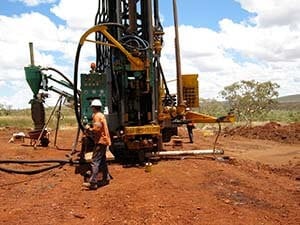The Glencore stock price was extremely volatile again today (Thursday), as investors remain concerned about the company's health and its industry prospects.
Shares of Glencore Plc. (LON: GLEN) jumped more than 8% intraday to a high of 99.17 pence. But later in the session, the Glencore stock price gave back all those gains back and fell to 88.72p.
Today's volatility comes after the Glencore stock price plunged 29% Monday. Year to date, shares are down a whopping 70%. The Glencore stock crash happened amid new reports that the $18 billion in short-term loans it uses to buy, sell, and ship goods is not as safe as the company claims.
 Mounting fears of a serious slowdown in China's economy have pressured metal prices and, in turn, the Glencore stock price.
Mounting fears of a serious slowdown in China's economy have pressured metal prices and, in turn, the Glencore stock price.
The deceleration in economic activity in China, the world's second-largest economy, has walloped commodity prices and pressured global trade. Copper, aluminum, nickel, zinc, coal, and more are all down more than 25% compared to a year ago.
Glencore is indeed a leading mining company. Just prior to its 2011 initial public offering, Glencore disclosed it controlled 60% of the world's zinc, 50% of copper, and 45% of the lead markets.
Glencore repeatedly said in statements this week that its business "remains operationally and financially robust." The company says it has "positive cash flow and good liquidity and absolutely no solvency issues."
Glencore also maintains it is positioned to weather current commodity market conditions. It's working to reduce its net debt of nearly $30 billion and preserve its investment-grade credit rating. The company is selling assets, cutting its dividend, and issuing new shares with the aim of reducing net debt by $10 billion by the end of 2016.
While Glencore maintains it is a mining company, it's really a commodity trading firm.
Its trading unit has generated an average $2.3 billion annually since 2010 in adjusted earnings before interest and taxes. In 2014, it earned $2.8 billion. In the first half of 2015, the total was $1.1 billion.
While the company's trading arm was supposed to give it an edge, it now looks like a very troubling division. And that means there is more pain ahead for the Glencore stock price...
The Glencore Stock Price Has Further to Fall
On Monday, the European Union published details of its new financial regulations for commodity markets.
The new rules will affect companies like Glencore that buy and sell sizable volumes of a commodity and hedge their stocks of raw materials with large positions in the financial markets.
Currently, there are no limits on the percentage a single trader can hold. But that's about to change...
Market participants will soon only be able to hold 5% to 35% of a commodity derivative's total open interest.
The new standards also state that if a company's specific trading business is above a certain threshold, which varies depending on the business, it will be subject to financial regulations. Additionally, if more than 10% of its total trading business is deemed speculative, rather than intended to manage risk via hedging, the company will also need to be treated as a financial firm under the new rules.
[mmpazkzone name="in-story" network="9794" site="307044" id="137008" type="4"]
Big traders like Glencore are currently not subject to the same requirements as banks. These include conditions such as setting aside money to backstop their trading and limiting the number of contracts they trade over any specific period.
The European Federation of Energy Traders said the new legislation "could trigger a cascade of negative impacts" for firms like Glencore. That obviously will continue to add downward pressure to the Glencore stock price.
To be sure, the world's largest commodity trader is at a high risk of default.
"Right now the Glencore event is still playing out," says Money Morning Global Credit Strategist Michael E. Lewitt. "But one thing is certain. It is going to have a near-immediate, hard-hitting effect on all the risk assets out there - just like AIG's collapse did in 2008."
Lewitt explains that Glencore is an essential link in a networked global financial system. "It is an important counterparty to many of the largest financial institutions in the world, who are in turn counterparties to other financial institutions, who are in turn counterparties in an endless chain of relationships that keep the global markets operating," Lewitt said.
The falling Glencore stock price, and the rising trend of corporate defaults, signals a new painful phase that could rock the world akin to the 2008 global financial meltdown...
Stay informed on what's going on in the markets by following us on Twitter @moneymorning.
Related Articles:
- CNBC: Traders Start Pricing Glencore Bonds like Junk
- The Wall Street Journal: EU Published Details of Tough New Commodity Trading Regulations
- The Wall Street Journal: Glencore Shares Seesaw in Volatile Trading


